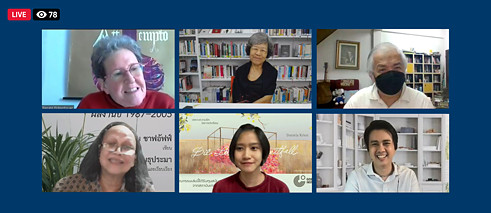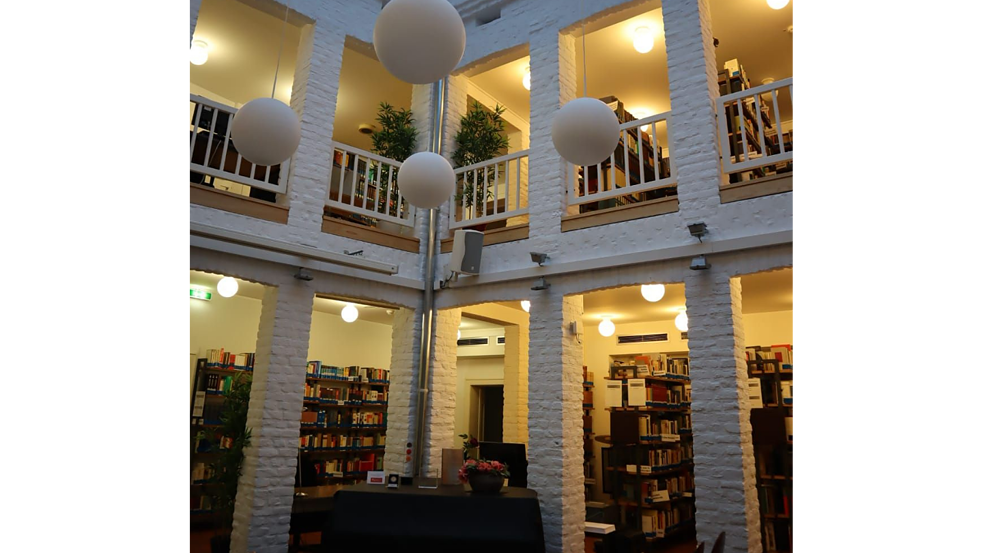International Translation Day
Translation is more than just paraphrasing

Due to the spread of Covid-19, the 2021 Goethe-Institut Thailand celebration of International Translation Day had to be delivered through Facebook Live, but despite this, we still gathered together to applaud the work of translators worldwide. Because translation is not simply a matter of extracting raw linguistic meaning, but also involves transmitting understanding and knowledge of the cultural context within which that meaning is embedded, translators act as global cultural diplomats, and on International Translation Day, we were keen to recognize this vital work.
For this year’s celebration of International Translation Day, we invited a number of translators and editors to discuss their work in translation, the challenges that this has entailed, and how this has varied when working on different types of literature. Our guests included Ittinat Seeboonruang, a professional interpreter who led the talk, Dr. Renate Birkenhauer, the honorary vice president of the Europäisches Übersetzer-Kollegium in Straelen, Choedchawee Sangchandr, a translator of many works including ’Strafe’ by Ferdinand von Schirach, Ruangdej Chandergiri, an editor, Sudawan Sindhuprama, the translator of ‘Rirkrit Tiravanija: Set, Szenario, Situation, Werke 1987–2005’ by Jörn Schafaff, and Piyakal Sinprasert, who has translated ‘Die Liebe im Ernstfall’ by Daniela Krien.
Das Europäisches Übersetzer-Kollegium: A translators’ retreat
Das Europäisches Übersetzer-Kollegium, Europe’s foremost translation centre, was established in 1978 with the goal of helping translators meet and exchange their knowledge and experiences, and of providing a space where translators working on literary projects could stay for longer periods of time. The EÜK has also proved to be a channel through which translators have been able to build international networks and jointly develop and raise professional standards. Over the past more than three decades, some things have changed dramatically, and at first, there were no computers on site and so translators congregated in the library to consult its dictionaries and reference works. However, other aspects of life at EÜK remain much as they always have been, and translators still come filled with inspiration and stay to work with spirit and dedication. Although translation is a solitary activity, at the EÜK, residents learn and develop together, and behind the silence and studiousness of the institution, lively debates abound, with translators gathering in the kitchens at lunchtimes, dinners, and deep into the night to discuss their work. Every year, the EÜK also invites writers to meet overseas translators who are working on their material. Writers usually stay for one week, allowing time for translators to work with authors to deepen their understanding of the text and to better uncover the author’s intent. Das Europäische Übersetzer-Kollegium
| © Prodpran Arunyig
Das Europäische Übersetzer-Kollegium
| © Prodpran Arunyig
Dr. Renate Birkenhauer spoke about the role of the translator, explaining that this work involves sacrifice and dedication. Although technology has created shortcuts that appear to do away with the need for translators, it still takes human understanding to know how to choose exactly the right word to fit a particular context because safely transplanting meaning from one language to another is no easy task. The translation of the classics, for example of Goethe’s Faust, is an undertaking that seems to return for every generation, and when a new translator is setting out on this, finding an authentic voice requires knowledge of both the language of the period and how prior translators tackled this challenge. But simple knowledge of the source language is not sufficient to qualify one as a translator, and translations are built on the twin foundations of reading and literary research, though perhaps more important than anything is the translator’s mastery of his or her mother tongue.
Germany’s linguistic and cultural identity is reflected in its poetry and its novels, and this literary tradition opens to the reader the nation’s landscapes and history, its tones and intellectual colours, and its politics and its dialects, and so translations and translators need to act on behalf of authors as messengers conveying all this to new groups of readers.
The heart of translation
Language is at the heart of translation, and when choosing the most appropriate way to express in Thai what was originally written in another language, translators need to understand not just the background of the text but also that of the writer. This helps the translator understand the source text and then to use language that is in keeping with its social, cultural and historical context, though the translator also needs to consider the linguistic context of the Thai that is used, and only when a word is well known in Thai or when it lacks a definition can it be transliterated. Translators should also have knowledge of specialist vocabulary, and they should be careful to follow the original text closely and neither add to nor omit from this, though this is complicated by the fact that Thai and German are fundamentally different and so translators need to find common ground linking the two. When looking for this and when trying to find the right voice, translators therefore need to work at least as hard as writers, and they do this by constantly seeking out new knowledge, and by participating in translators’ associations and networks. This then helps to develop translators’ broad linguistic knowledge and their narrower abilities in translation, though each new project will once again open up new worlds and new fields of knowledge for the translator to explore and to enjoy.Translation: A group enterprise
When publishing translated works, publishers need to coordinate the work of editors, translators and designers, while for their part, translators need to understand the ethos, business strategy and market position of individual publishers and then to find the publisher that best matches their proposal. Editors work closely with translators throughout the translation process, though because a book’s cover and title are the first point of contact with readers, clearly understanding the book’s contents will help designers and editors craft these for maximum effect. Attention should also be given to understanding the book’s potential readership.Watch recorded Facebook live here